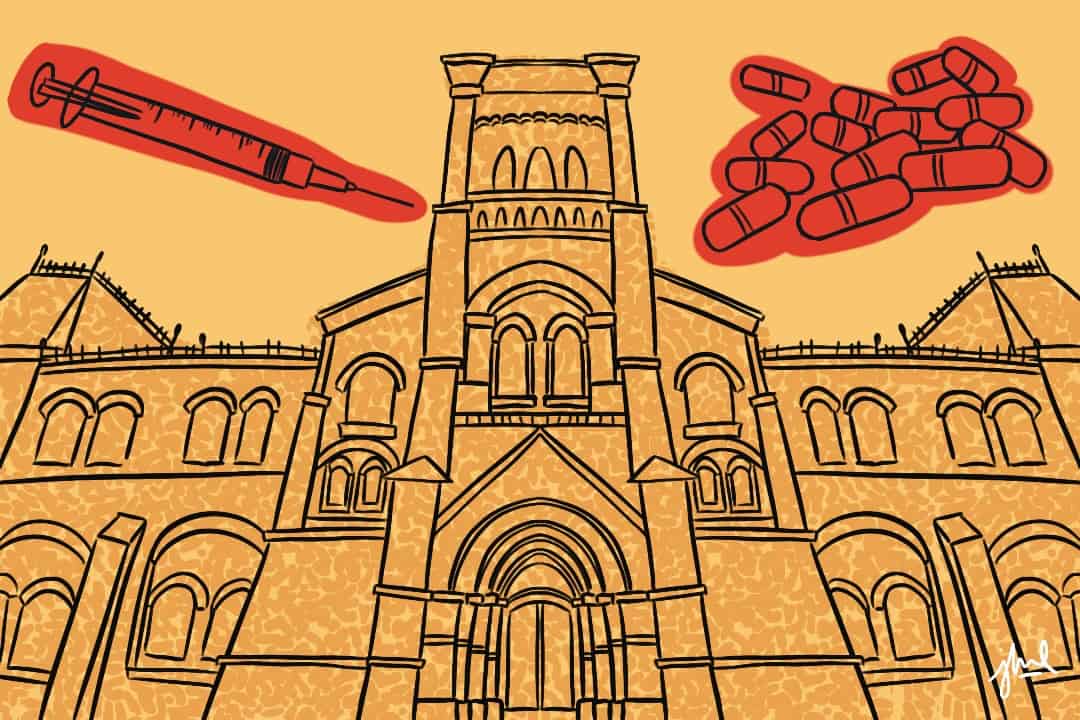August 31 marked the 21st International Overdose Awareness Day. International Overdose Awareness Day serves many purposes, including raising awareness of overdose-related harms, discriminatory drug policies, the ongoing and violent War on Drugs, and the stigma associated with drug use. This day also marks a time to remember, mourn, and celebrate the lives that so many communities have lost to overdose-related deaths.
The settler state of Canada is experiencing an unprecedented overdose crisis exacerbated by an increasingly toxic and unpredictable, unregulated drug supply. The drug crisis in Canada is escalating, yet the University of Toronto remains the only major university in Ontario without overdose response measures in place to prevent and respond to overdoses on and around campus.
This grief and loss is affecting many in Toronto. Preliminary data for 2021 released by the City of Toronto shows that Toronto Paramedic Services attended 6,362 overdose-related calls. This is a 65 per cent increase compared to 2020, and is likely a grave underestimate as it does not include the number of overdoses and overdose-related deaths that paramedic services did not attend.
This same data shows that the highest concentration of overdose-related calls occurred in the downtown core, between Roncesvalles Avenue, Bloor Street, and the Don Valley Parkway — the same borders that host the University of Toronto St. George Campus.
Despite the increasing harm that people who use drugs — including students — are facing, the University of Toronto fails to promote and provide low-barrier harm reduction measures, such as naloxone distribution and overdose prevention training, which are crucial to minimizing the risk of fatal overdose.
We are unaware of any formal curriculum on harm reduction and overdose prevention in U of T’s clinical health programs. Students also do not have easy access to naloxone kits or overdose response training on campus.
With almost 30,000 apparent opioid toxicity deaths in Canada between 2016 and 2021, this silence and inaction by the university is no longer acceptable.
Last year, with the support of 24 other student groups, we wrote an open letter to President Gertler calling for overdose response training, low-barrier access to naloxone kits, and the incorporation of harm-reduction education and overdose response training into the university’s clinical programs. We received no response.
After contacting the Office of the Vice-Provost, we were told that “the decision whether to have Naloxone available on campus has been a topic of much consideration… and we will be in touch to schedule a time to meet…”. That was almost a year ago and we have heard nothing since.
Although the Leslie Dan School of Pharmacy is now offering naloxone at their pharmacy, it is only available to individual students and by appointment. There is no coordinated or comprehensive response to reach students on a campus-wide scale.
While the university administration watches this crisis unfold, students continue to seek out overdose prevention and response training. Beginning in 2019, our student group has hosted online and in-person trainings attended by hundreds of students and we are consistently approached by other groups from a broad range of disciplines to train their members.
University of Toronto students recognize the need for comprehensive overdose prevention and response training, but as a small student-led group, we do not have the capacity to meet the needs of the entire campus community.
That is why, this year, we are expanding our call to action. It is time for faculty to join our calls in demanding the university respond to this devastating overdose crisis. To their professional benefit, University of Toronto faculty receive millions of dollars in funding every year to research, publish, and present on harm reduction, drug use, and social justice. However, faculty voices remain noticeably absent in the harm reduction movement on campus.
To echo the words of Rinaldo Walcott, we need “more action and less sentiment.” We need our faculty to leverage their knowledge, expertise, and positions of power to hold the university accountable for the health and well-being of people who use drugs on campus and in our communities.
Once again, we call on University of Toronto students, staff, and especially faculty, to advocate for and implement the following measures immediately:
- Mandate overdose response training for all first responder staff on campus, including residence staff, emergency first responders, campus police, and campus security;
- Equip these groups with naloxone kits and training resources;
- Ensure that the Health & Wellness Centre provides easily accessible naloxone kits and regular, recurring overdose response training sessions for students and staff, preferably facilitated by a harm reduction worker;
- Implement harm reduction education and overdose response training as part of all formal curriculum for clinical programs, including nursing, medicine, pharmacy, public health, physical therapy, occupational therapy, and social work.
Signed,
University of Toronto Harm Reduction Collective
The University of Toronto Harm Reduction Collective, formerly Canadian Students for Sensible Drug Policy (CSSDP) Toronto Chapter, is a grassroots network of students and community members committed to harm reduction, abolition, public health, drug policy reform, and social justice. Through direct action and education, we advocate for the decriminalization and legalization of all drugs, police and prison abolition, decolonization, disability justice, Black, queer, trans, and sex-worker liberation, and other related social justice and health equity issues.
Join us at our fall overdose response training on September 20 from 7 pm to 8 pm for students and on-campus staff. See our Eventbrite for more information and registration. If you have any questions, or would like to get involved, contact us via email [email protected] or find us on Twitter @UofTHRC.


